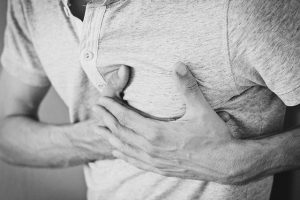What is a heart attack?
It is an event related to multiple causes and risk factors such as high cholesterol, blood pressure, cigarette smoking, as well as genetic or hereditary factors, which predispose to injury to the blood or arterial vessels of the heart that causes obstruction partial or complete, producing pain in the center of the chest that is usually oppressive or weight type, which occasionally radiates to the neck, jaw or both arms.
This is reflected in the changes that can be evidenced by taking an electrocardiogram and the increase in biomarkers in the blood called troponin, a complex of structural proteins that regulate the contraction of cardiac and skeletal muscle.
Warning symptoms before a heart attack
Symptoms may initially manifest as deterioration in the patient’s ability to exercise or emotions, which can progress to:
- Pressure and pain in the chest or arms, which may spread to the neck, jaw, or back
- Nausea, indigestion, heartburn, or abdominal pain
- Shortness of breath or fatigue
- Cold sweat
- Sudden fainting spells, in some cases these fainting spells occur and are immediately diagnosed as sudden death, however upon entering the emergency department these patients are resuscitated and it is identified that it was a heart attack.
It should be clarified that the term pre-infarction does not exist, when there is strong chest pain but it is not constant or accompanied by other symptoms, what is occurring is angina pectoris, and unlike infarction, in this, the biomarkers trooping levels are not elevated enough to produce this coronary event.
Recommendations for the prevention and management of infarction
- It is not recommended to take medications not previously prescribed by the cardiologist as a heart attack prevention treatment, since these medications must be controlled and are usually given to patients who have already presented a first coronary event.
- If you identify that the symptoms last more than 15 to 20 minutes, you should go immediately to the emergency department, to receive early treatment and avoid severe consequences.
- Self-medicating uncontrollably can worsen your condition, consult previously if it is advisable to take some medications at the time of suffering a heart attack since the chest pain that may be manifesting is due to other conditions such as muscle aches, problems in the esophagus or stomach.
- During post-infarction recovery, the essential thing is to meet the secondary prevention goals, the pillars of which are: to control blood pressure, weight, sugar levels, cholesterol, responsibly take the prescribed medications, do cardiopulmonary rehabilitation with the Center of Cardiac Rehabilitation, having adequate nutrition, not smoking and increasing the consumption of fruits and vegetables.
- Follow the recommendations of the pharmacological treatment given by the treating cardiologist since non-adherence to this treatment can predispose the patient to a second infarction, in addition to causing obstructions in the coronary stent implant or coronary bridges in the case of those who undergo surgery. Medication adherence is key to your recovery and control of your disease.







